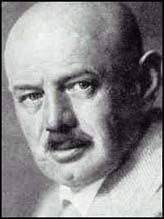 |
Dietrich Eckart was a central figure in the early days of the Nazi Party. Eckart was a wealthy nationalistic poet who was frequently seen at the side of Adolf Hitler before his death in 1923.
Eckart was born on March 23rd 1868 in Neumarkt. He came from a wealthy family and the expectation was that Eckart would become a lawyer like his father. He studied law and then medicine but he withdrew partway through a medical course at university and trained to be a journalist instead. Eckart also had a passion for poetry and spent many hours writing poems. He became a wealthy man in his own right when he became a major figure in the Berlin theatre scene. His adaptation of the play ‘Peer Gynt’ ran for 600 consecutive shows to packed audiences. Far more significantly, it allowed Eckart to move in circles that were to prove very useful for the fledgling Nazi Party in the early 1920’s.
Eckart married in 1913 and went to live in Munich.
His post-World War One poetry was nationalistic and refused to recognise the obvious situation Weim ar Germany was in after November 1918. Eckart condemned the German Revolution of 1918 and claimed that it was a Jewish-Bolshevik plot. In 1919 he wrote the poem “Storm Song” which contained the words “Deutsche Erwache!” (Germany Awake!). This two-word slogan was taken up by the Nazi Party as a rallying call.
In Munich, Eckart became acquainted with Anton Drexler and Gottfried Feder and between them they founded the German Workers’ Party. The party was one of many that could be called right wing and nationalistic that existed in the chaos of early years Weimar Germany. Through Drexler, Eckart met Adolf Hitler in 1919. While it is accepted that Hitler used people for whatever purposes he needed them for, it is generally considered that he developed a close friendship with Eckart. In 1920, Eckart took Hitler to Berlin. Here he used his connections to introduce Hitler to the likes of General Luderndorff. The World War One general – still seen as a hero by many in Weimar Germany – was taken by the ideas expounded by both Eckart and Hitler. While in Berlin Hitler also took lessons from a drama teacher in how to present himself while making speeches in public.
Eckart used his money to purchase the ‘Volkischer Beobachter’ on behalf of the Nazi Party. This was to become to official newspaper for the Nazi Party. Eckart initially edited the newspaper before the work was taken over by Alfred Rosenberg.
Eckart accompanied Hitler to party rallies and stood nearby when the new party leader gave public speeches. Eckart’s poems eulogised Hitler and referred to him as the future of Germany. For example:
“Wonders never cease; from the deluge is born a new world, while the Pharisees whine about their miserable pennies! The Liberation of humanity from the curse of gold stands before us!”
His other poems were either about the Nazi Party or the targets of its hatred – the Weimar ‘traitors’, the Jews, the Bolsheviks/Communists. His ‘Storm Song’ became the lyrics for the oldest Nazi song:
“Storm! Storm! Storm!
The serpent, the dragon from hell has broken loose!
Stupidities and lies his chains have burst asunder,
Lust for gold in the dreadful couch,
Red as with blood are the heavens in flames,
The roof-tops collapsed, a sight to appal.
One after another, the chapel goes too!
Howling with rage the dragon dashes it to pieces!
Ring out the assault now or never!
Germany awake!”
A few months before he died, Eckart published an unfinished made-up conversation between himself and Hitler. It was called “Bolshevism from Moses to Hitler”. Eckart never mentioned Hitler by name. But in it Eckart states that Hitler was the first man to recognise that Moses was the first true Bolshevik and that the Jews left Egypt because they had attempted to overthrow the ruling class there but had failed in this endeavour. Eckart claimed that it was Hitler who had first discovered the plan of the Jews to overthrow the world order and that it was only Hitler who could take a stand against this and save Germany and therefore the world from international Jewry. It was a theme that was taken up time and time again in speeches made by Nazi officials in the lead up to Janu ary 1933.
However, by 1923 Eckart was not a well man. He was a morphine addict and an alcoholic. He took part in the Beer Hall Putsch and like others on it was arrested. He spent a short time in prison but was released because of his poor health. Eckart died of a heart attack on December 26th 1923. The Nazi Party claimed that he died as a result of his treatment in prison when, according to the Nazis, he was beaten up. But it is more than likely that his addictions were more a cause of his death than anything else.
Hitler remembered Eckart in ‘Mein Kampf’. Volume 2 of the book ends simply with the name ‘Dietrich Eckart’ written in bold. In later years Hitler would hold what were referred to as ‘table talks’ and during these Eckart’s name was mentioned by Hitler on many occasions. One person at one of these ‘table talks’ said that Hitler referred to Eckart as his “North Star” and that his value to the National Socialist cause was “inestimable”. Once he had gained power Hitler allowed the 5th Regiment of the SS to wear an armband that had on it ‘Dietrich Eckart’.
July 2012
Related Posts
- Adolf Hitler led Germany throughout World War Two. His desire to create an aryan race was paramount in his ethos and political campaigns. Hitler had no…
